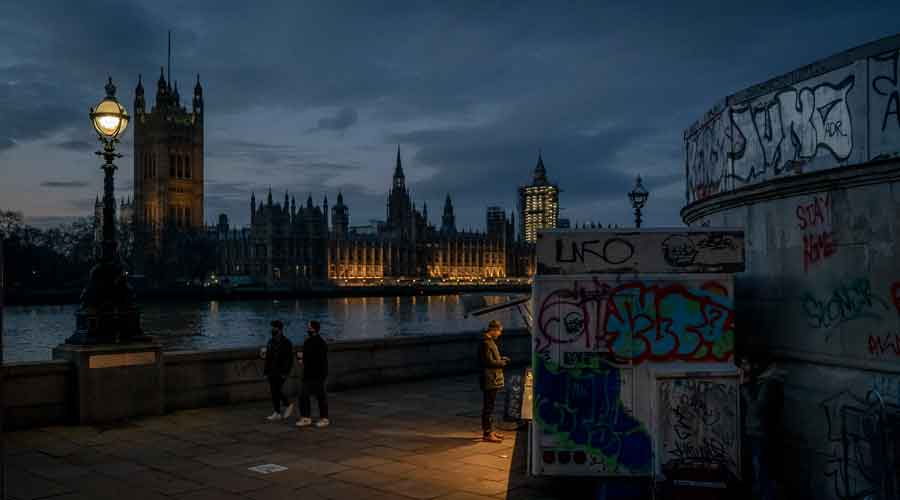Passengers from India intending to fly to the UK ought to be aware of tough new restrictions being brought in by the British government.
Firstly, they won’t be allowed in unless they can show a negative Covid test 72 hours before departure.
On arrival, they will have to isolate for 10 days.
But that is not all. From now on they will be required to take Covid tests on day 2 and 8 after arrival — and pay for the two tests from their own pocket. These tests aren’t cheap —£100 a time.
What the British government is determined to do is try and keep out mutations of the virus, such as the Brazilian and South African ones.
The double Covid-test regime will apply to all international arrivals.
Ahead of the formal announcement from the health secretary Matt Hancock, a health department spokesperson said: “Enhancing our testing regime to cover all arrivals while they isolate will provide a further level of protection and enable us to better track any new cases which might be brought into the country, and give us even more opportunities to detect new variants.”
The restrictions are even tougher for people coming from a “red list” of 33 countries, which includes South Africa and several such as Brazil and Argentina in South America.
Non-UK nationals from the “red list” are currently banned from Britain.
UK-nationals will have to go into quarantine at government-approved hotels for 10 days at their own expense. Many of these hotels around Heathrow and Gatwick airports happen to be Indian owned.
They will be patrolled by guards to ensure people don’t slip out when they are expected to remain confined to their rooms.
The hotel owners don’t like the fact they are expected to absorb losses by cancelling all their other bookings.
The government’s vaccination programme is going well. But there is confusion about how effective the Oxford-AstraZaneca vaccine is against the South African mutation of the virus in people over 65.
The Financial Times reported: “South Africa took delivery of 1m doses of the AstraZeneca vaccine last week, the first Covid-19 vaccines to arrive in the country, as part of a 1.5 million dose order from India’s Serum Institute.”
A study of 2,000 people by the University of Witwatersrand in Johannesburg found that two doses of the jab may only offer 10-20 per cent protection against mild or moderate Covid-19.
Nobody in the test group developed severe Covid-19 but the researchers said this “could not be assessed in this study as the target population were at such low risk”. Participants’ average age was 31 and they were otherwise healthy.
South Africa has stopped using the AstraZeneca jab for the time being.
Meanwhile, the British government has ordered 100 million doses of the AstraZeneca vaccine, which forms the basis of its efforts to offer protection to the most vulnerable and ease the third nationwide lockdown.
The Prime Minister, Boris Johnson, said there was “good evidence” that it was stopping most serious illnesses, as well as cutting the spread of the disease — “I think 67 per cent reduction in transmission with the Oxford/AstraZeneca vaccine”.
Boris and his ministers moved to calm nerves over the UK’s vaccine programme, following concerns that the Oxford university/AstraZeneca coronavirus jab might be less effective with the new South African virus strain.
Jonathan Van-Tam, England’s deputy chief medical officer, told a Downing Street press conference that “early data” did not suggest that the South African variant had a “transmissibility advantage” over the variant dominant in the UK.
“There is no reason to think the South African variant will catch up or overtake our current virus in the next few months,” he said, noting that 147 cases of the “501.V2 mutation” had been found in the UK.
Van-Tam added that coronavirus would probably have to be treated like seasonal flu in future with further rounds of vaccinations. “I don’t think we’ll eradicate coronavirus?.?.?. I think it’s going to be with humankind forever.”
Almost 13m people have now received a first dose of a Covid-19 jab as the government confirmed that its mid-February target for vaccinating the 15m most vulnerable Britons would be met. The government has even invited illegal immigrants to register with a GP and get the vaccine – although this did not mean they would be given residence rights.
The last official estimate found about 430,000 people were in the country with no legal right to remain, but that figure dates back to 2005. It would be surprising if Indians did not figure in this group.











